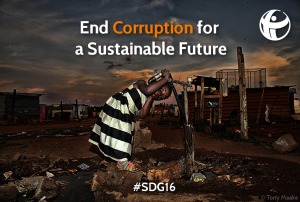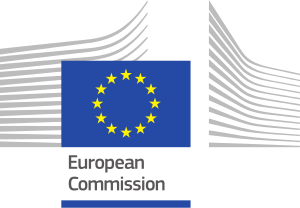Last year the world’s governments agreed to a series of goals to create a better, more equal and sustainable future, the Sustainable Development Goals (SDGs). These 17 goals range from reducing inequality and poverty to providing quality healthcare and education for all. Unlike previous development targets these goals have for the first time acknowledged the universality of the problems we face and the need to tackle them together. This comes with the recognition that fighting corruption is critical to achieving a sustainable future. Goal 16 is about peace, justice and strong institutions. To do this we must deliver justice, stop illicit financial flows and end corruption and bribery.
Delivering on these goals now demands action to refine targets to measure progress and ensure processes for monitoring and accountability. It requires further political commitment and action to enable resources, policies for change and of progress. This call to action is universal in nature and will require collaboration and co-operation by all governments and across all sectors if they are to be successful. The European Union, as a signatory to the SDGs, has an important role to play in making the 2030 Agenda for Sustainable Development a reality at home and abroad.

At home:
The EU needs to develop an overarching EU Sustainable Development Strategy that includes both internal and external action, including a plan of implementation, with concrete targets and timelines. This strategy should coordinate the EU’s overall achievement of the 2030 Agenda, each of the 17 SDGs, 169 targets and the use of agreed indicators, to help the EU and its member states focus clearly on what needs to be achieved, and how. The EU also needs to develop strong monitoring, review and accountability mechanisms and for there to be a consultative process of indicator selection. The EU should also consider citizen-generated data to help track progress towards the achievement of the Goals.
Abroad:
Together, the European Union and its Member States are the world’s largest aid donor providing over half of all global development aid. Development Policy at the EU level is currently being revised in light of the Sustainable Development Goals. Abuses of power and financial, natural and other resources continues to have serious negative impacts on development, aggravating poverty, conflicts and political, social and economic instabilities. Every year an estimated $1 trillion of illicit financial flows leave developing countries in the form of tax evasion, embezzlement, bribes, money laundering and smuggling. These illicit financial flows are now rising twice as fast as global GDP, depriving countries and their people of resources that could be put towards achieving trans-formative sustainable development gains. EU development aid should address and be subject to anti-corruption efforts to ensure Sustainable Development.

